Yoguely is reader-supported. When you buy through links on our site, we may earn an affiliate commission. Learn more
How I Got 2 Paid NASA Internships in High School (Formula)

Today you’re going to learn exactly how to land a NASA High School Internship.
This is the same approach I used to land 2 NASA internships in high school.
Let’s get started.
- Eligibility
- When to Apply
- Benefits of Applying: Self-Discovery
- Benefits of Applying: Mentors can reach out to you
- Deadline
- Do I Have What It Takes?
- 3 Tips to NAIL Your High School Internship Application
- Tip #1. Tell Your Complete Story of What You Are Capable Of.
- Tip #2. Put Yourself in the Employer’s Shoes.
- Tip #3. Show How You Fit in with the Work Culture.
- How Hard Is It to Be Accepted into the NASA High School Internship Program?
- What to Do About Rejection
- What If English Is Not My First Language
- What Disciplines or Areas can I work on at NASA?
- How much money does a NASA high school intern make?
- Which NASA facilities offer paid high school internships?
- Where to Find Paid NASA Internships
- Should I Accept an Unpaid NASA Internship?
- How to apply to NASA as a High Schooler
Getting a NASA High School Internship
Are you interested in a high school internship, working to support the expansion of knowledge for the benefit of humanity?
Do you want to explore career paths and discover what you may be passionate about?
Then listen in to learn how to get your first paid high school internship. Here is how I became a high school intern for NASA.
Welcome back my people! I’m your host Aida Yoguely. And mathematics and computers have always fascinated me.
Back in high school in Puerto Rico, I would spend time with my friends solving problems just for fun.
When I was not nerding out, I was skateboarding or playing the electric bass.
Then I learned that for a summer, I could work directly with NASA engineers. Doing work that matters. Plus, I would receive money for my work.
So, I naturally looked into it.
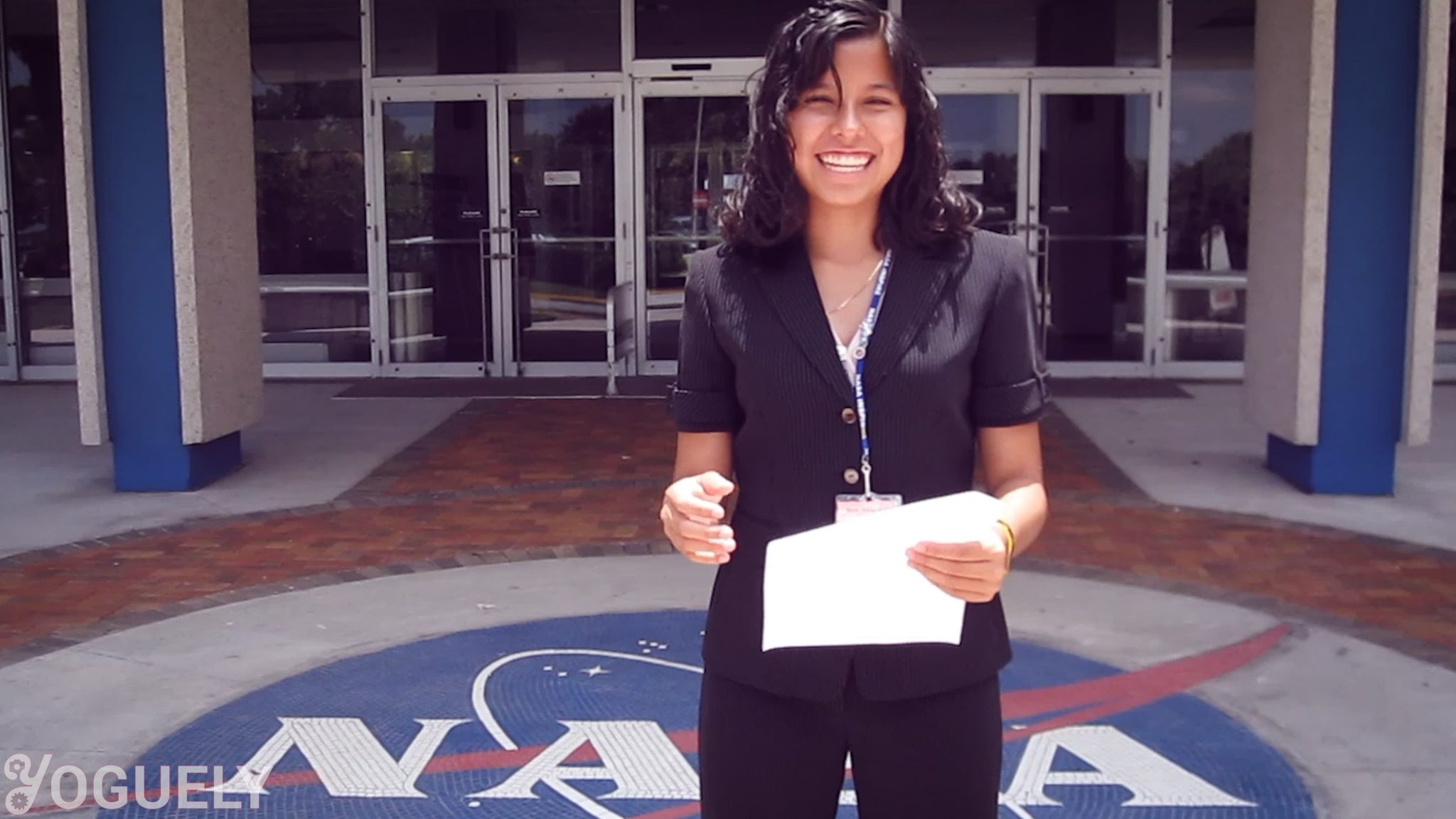
Eligibility
To be eligible, I had to be a U.S. citizen, have a grade point average (GPA) above a 3.0, be at least 16 years old, and be enrolled in school.
When to Apply
They say luck is what happens when preparation meets opportunity.
All my life I had been building my education for a chance like this to come along.
One thing we can all be certain of is this. Your probability of being rejected is guaranteed, if you do not apply.
To put it another way, the best time to invest in yourself was actually yesterday. The second-best time is NOW.
With this in mind, I knew that the high school internship application was not going to wait for me. So, I took a chance and applied right away.
Benefits of Applying: Self-Discovery
In the event that you do not feel ready, filling out the application can still be supremely beneficial. By doing so, you will identify areas you need to work on.
Then you can make a plan to achieve that by the next high school internship cycle.
Benefits of Applying: Mentors can reach out to you
Also, by being in the applicant pool, mentors can read your profile in the database. If they believe you are a good fit, they might just reach out to you.
Mentors have contacted me and ask me to work for them. This was without me directly applying to their job listing.
Sometimes I have had to decline because it does not align with my interests.
So, what do you think, like to give it a try?
NASA Internship Deadline
The summer application officially closes in late spring. However, by then, most mentors have already matched students for the job positions.
I would recommend applying by mid-January, the latest. Early bird gets the worm.
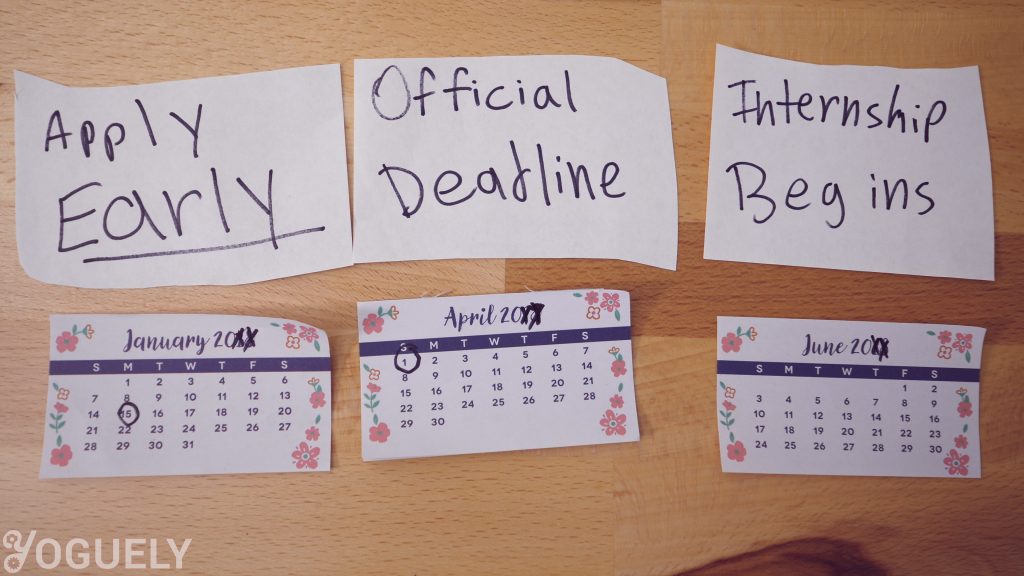
Do I Have What It Takes?
I got this question from one of you on my social media.
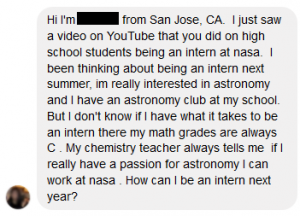
“Hi I’m … from San Jose, CA. I just saw a video on YouTube that you did on high school students being an intern at NASA. I been thinking about being an intern next summer, I’m really interested in astronomy and I have an astronomy club at my school. But I don’t know if I have what it takes to be an intern there, my math grades are always C. My chemistry teacher always tells me if I really have a passion for astronomy I can work at NASA. How can I be an intern next year?”
First of all, you do not need to be a first-place winner or have straight A’s. That just shows how good you are at those specific problems.
In middle school, I won first place in the “state” math competition across all of Puerto Rico.
And if you asked me to solve those same problems today, I might not know the answer right away, but I know where to find them.
An educated human knows where to get the knowledge when they need it, and how to organize the information into a plan of action. Check out Think and Grow Rich by Napoleon Hill and Arthur Pell (paid link) book that goes further into this idea.
Very rarely will you go into the real world and encounter the exact problem you saw in math class.
Real world issues most of the time have no step-by-step instructions and no exact solution.
So, to answer the question, reflect on your extracurricular activities. If you can show that you are a critical thinker, who is resourceful, able to process knowledge, and collaborate in teams; Then you have a pretty good chance of being a NASA high school intern.
3 Tips to NAIL Your High School Internship Application
These tips to stand out come in handy for other companies and college as well. So, keep your ears open.
Tip #1. Tell Your Complete Story of What You Are Capable Of.
I listed out my computer skills such as coding webpages with HTML.
Then in my essay I shared how I applied these abilities. Like how I designed a website showcasing the Math Club’s recent activities.
Finally, in the letter of recommendation, my teachers assessed and backed up my capabilities through their own point of view.
Picture this, the form is like a spider web.
Where each keyword appears connected in many sections of the internship application. And the big picture shows how the company and you can both benefit from each other.
Your chances to get in totally skyrockets if you can demonstrate that.

Which leads me into…
Tip #2. Put Yourself in the Employer’s Shoes.
What is their objective? In any job application, the objective of the employer is to hire the most qualified person available to do the work they need done.
So, find a job position that aligns with your current skills and interests.
If you feel that you can do over half of the tasks listed, then it is worth a try.
Bosses do not expect you to know everything on the first day of the job. Regardless, managers do expect you to be a fast learner, figure it out, and get the job done.
Tip #3. Show How You Fit in with the Work Culture.
Employers wants to hire someone who can work comfortably in an environment that shares their mission and values.
Taking 5 minutes to read the employer’s purpose will place you ahead of the game.
Let’s see what NASA’s website has to say. NASA’s core values are safety, integrity, team work, and excellence.[1]
Hey! Those align perfectly with my core values.
So, in the essay I included my leadership as president of the school’s math club. Highlighting professional attributes like my curiosity, resilience to overcome obstacles, and agility in dealing with unforeseen circumstances.
How Hard Is It to Be Accepted into the NASA High School Internship Program?
Are NASA internships hard to get? Like one of my NASA mentors once said, “it is sort of just a supply and demand problem”.
If a mentor does not select you, it might not mean that you are inadequate.
It could mean that spots are not available anymore (too much supply). Or it could mean that there is no need for someone with your skills and experiences right now (no demand).
The NASA high school internship acceptance rate changes from year to year depending on funding. I’ll give you a rough idea based on my previous experiences back when there was more money going around for education. It was roughly 15 students per space center or facility, which could be around 150 high school students total.
What to Do About Rejection
When it comes to applying to jobs, rejection is a common occurrence.
From an early age, it was clear to me that there are things over which I have control over. Like the goals I set for myself.
Then, there are things over which I had absolutely no control over. Like whether there are 1000 other high school internship applicants.
Then there are things over which I have some control but not complete control. Such as whether the high school internship program accepts me or not.
For them to select you, your focus must be on making the best effort and then submitting it as many job listings as necessary until you land the one you desire. Check out A Guide to the Good Life : The Ancient Art of Stoic Joy by William Braxton Irvine (paid link) book that goes further into this idea.
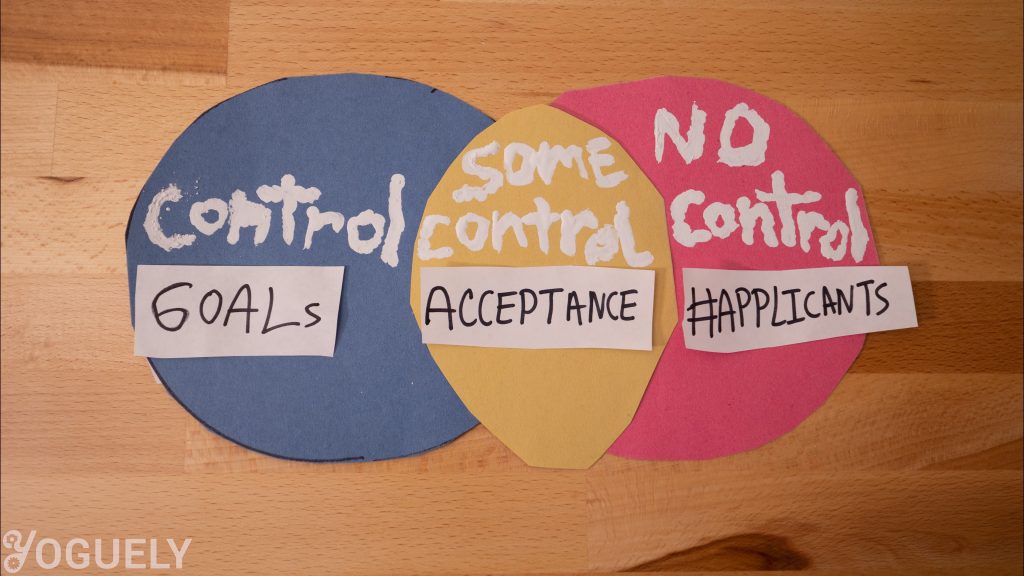
Ah, Too many people are so much smarter than me! It’s difficult to stand out.
When I applied, I never once doubted my competence. And my focus was never on the competition. That’s a distraction.
I had full confidence in myself and I could visualize myself at the NASA high school internship, standing at NASA’s launch pad, typing away in a cubical, shaking hands with brilliant scientists.
This is the first step, believe in yourself, then make a plan, and get help from your teachers.
What If English Is Not My First Language
I grew up in Puerto Rico, where English is not my first language.
But the more I practiced it, especially after being flown to the United States for the internship, the better I got.
I purposefully put myself in an environment that forced me to talk, write, and think in English.
The reason was because I wanted to prepare myself for an even bigger challenge: getting into a top ranking engineering school in the United States.
Knowing that this NASA experience was only one of the many challenges I plan to face in my career, I didn’t worry about it.
You can learn anything.
It’s only a matter of time. So do not let a language barrier stop you.
The great thing about the application and essays is that you can take your sweet time to write it. So use all the tools at your disposal, ask for help from your English teacher, and use the power of the internet.
What Disciplines or Areas can I work on at NASA?
When you are a high school student, you don’t yet have a Major or Degree. Nevertheless, your skills can still be used to make a valuable contribution to the space program.
In high school, NASA picked me, because of my programming and communication skills, to make a website for a branch at the Kennedy Space Center headquarters.
For this, I spent half of my time interviewing professionals, understanding what they do, and the other half coding it into the system.
Even though I did not have specialized engineering skills at the time, I became part of the NASA network. This network connected me to real rocket scientists and many different engineering fields.
The topic of the work might be advanced, but the assigned task will be doable for your education level.
For instance, I have met students in the NASA high school internship program who have worked at altitude chambers, on CubeSat technology, databases, doing ecological research, pressure vessels, and even in materials science.
Students could even work in business, marketing, journalism, art and multimedia, space medicine, and on virtual reality (VR) simulations. Gosh that must be a lot of fun.
How much money does a NASA high school intern make?
The NASA high school internship program gave me a stipend based on the minimum wage for the state in which the NASA facility is located.
In particular, I went to the facility closest to Puerto Rico, the NASA Kennedy Space Center in Florida.
The minimum wage in Florida back in the day was $7.21 an hour, that is $1153.6 per month, which interestingly would equate to $13,843.2 if I had done the job for a full year.[2]
The pay received was before tax. Therefore, the amount I received was much less than this.
Which NASA facilities offer paid high school internships?
Are NASA internships for high school students paid? Not all NASA locations offer paid internships for high schoolers.
Some offer non-paid internships which they like to call “volunteer opportunities.”
Others have no high school internship programs at all.
Where to Find Paid NASA Internships
The way to find a paid internship is either through the NASA Internships and Fellowships database, by applying directly to an existing NASA program, or by seeking a NASA internship funded by other organizations such as your State’s Space Grant Consortium.
Many paid internships at NASA are actually not funded by NASA themselves but by third-party organizations. I once landed an internship through the NASA Internships and Fellowships portal which happened to be funded by the Georgia Space Grant Consortium.
Whether there are internships for high schoolers available at a specific NASA facilities will depend on the availability of funding and mentors each semester.
Unfortunately, not all of the internships listed in the NASA Internships and Fellowships website may have funding for your stipend. You may have to wait until the official offer letter comes in to know the stipend amount or whether there is a stipend at all.
If there is no stipend, you could seek your own source of funding by reaching out to organizations such as your State’s Space Grant Consortium.
Should I Accept an Unpaid NASA Internship?
During my paid undergraduate internship at the NASA Ames Research Center in California, I met many high schoolers who were working there for no pay.
They were unpaid interns under the Volunteer Internship Program.
I thought to my self, “That’s crazy! How can anyone be expected to pay out-of-pocket for food, housing, and commuting expenses while working in the Silicon Valley area.”
Those expenses have to fall somewhere and if you can’t afford it yourself, they would fall on your parents. Or you could get a high interest rate loan and painfully watch your debt grow.
If it were me, I would have had to simply miss out on the opportunity to get a prestigious name like NASA on my resume if I had to pay for it.
And this is the case of many other brilliant but lower-class students.
Unpaid internships are bad for you, terrible for employees, and detrimental for society.
Displaying an unpaid internship on your resume shows that you were willing and capable to work for free, so the next place you try to get a job might offer you a low-ball salary based on this.
The more people willing to accept an unpaid internship, the less likely companies will be willing to pay someone to do the work another can do for free.
Being in debt is no joke. It’s a nightmare of a spiral that does not get easier the more unpaid internships you accept.
Consider alternative job opportunities. Remember that you are valuable and to the very least deserve to have basic living expenses covered so that the internship leaves you with zero debt.
It’s not now or never.
If you decide to pass an opportunity this year, keep in mind that there will be more down the road.
How to apply to NASA as a High Schooler
A CROEMita from Puerto Rico asks,
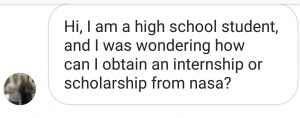
“Hi, I am a high school student, and I was wondering how can I obtain an internship or scholarship from NASA?”
We’ll have to leave questions on scholarships for another time. As for NASA high school internships, I’ll leave the latest link where you can apply in the references below.[3]
Then reach out to mentors to increase your chances of being selected.
If you get an offer, carefully compare it with all other offers.
Review what does the long-term salary and career path there look like. And keep in mind that a job at NASA isn’t as stable as you think.
Once you accept an internship, you begin to specialize in that area, making it difficult to switch into different fields later on.
After my first NASA high school internship, I kept applying every year and landed 6 more internships with NASA, using these secret techniques.
They work.
After graduating from engineering school and accumulating all these experiences, NASA offered me a full-time job as a civil servant.
Share this with other students interested in NASA high school internships.
Leave your thoughts in the comment section below.
Or join the discussion in the Yoguely Community Forum where I will be answering your questions and giving feedback.
I’m Aida Yoguely. See you in the next post.
To stay tuned, join our newsletter and get the latest content straight to your inbox.
Video
Be sure to subscribe and hit the notification bell to stay tuned for the latest videos.
References
thumbnail image credit of stair trails and SpaceX Crew Dragon spacecraft on station: NASA
1. ^ Blodgett, R. (Ed.). (2018, May 10). “Our Missions and Values” . NASA Retrieved 12 September 2019.
2. ^ “2009 Florida Minimum Wage Increase”. Labor Law Center. (2016, May 16). Retrieved 12 September 2019.
3. ^ ” NASA Internships“
- Why Helicopter Money Is Inflationary - 2021-10-09
- How Interest Rates Affect Inflation - 2021-10-08
- How Long Has Inflation Existed? - 2021-10-01
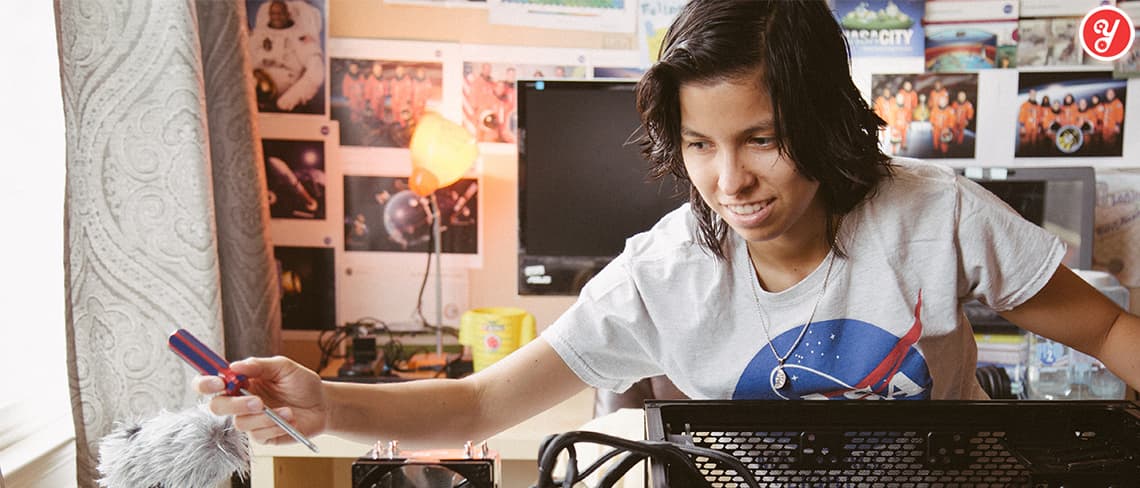
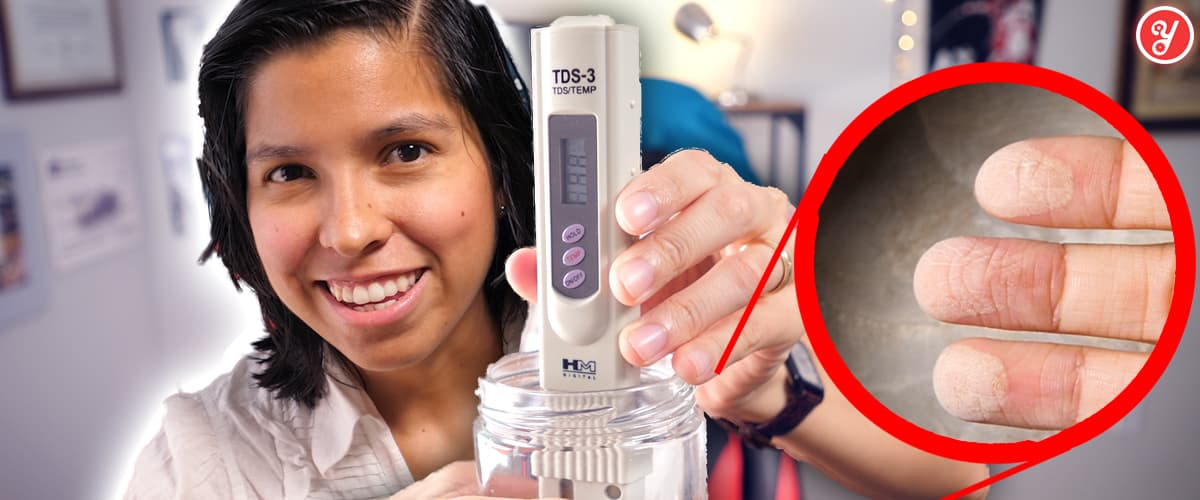

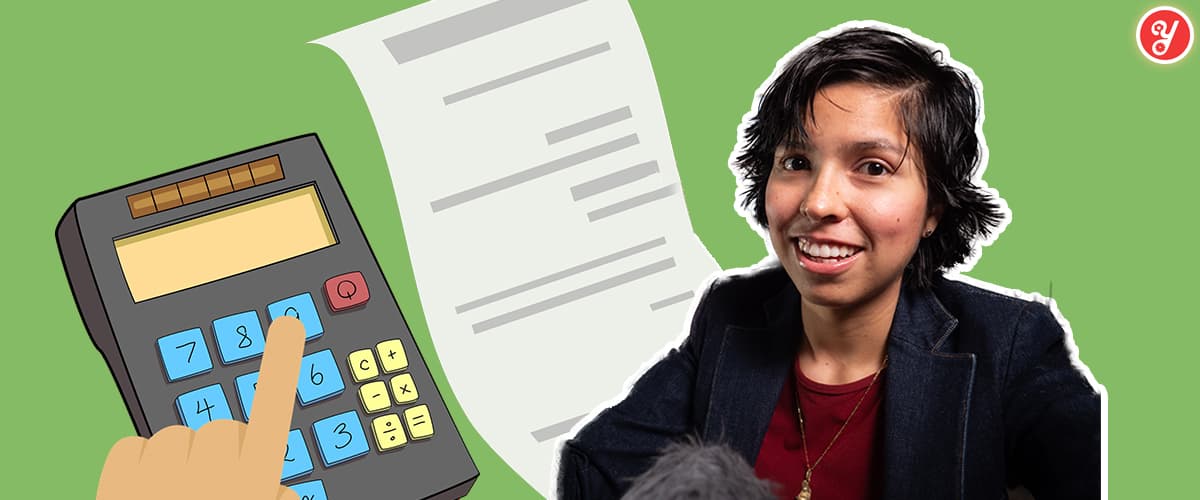

One Comment
Prateek Pinto
Hi. When I go to the link to apply for an internship, marked at 3 on the references, I go to internships and apply. But, under listings, all of them have undegraduate freshman, sophmore, junior, senior, masters, and so on. There are no high school listed oppurtunities for internships. Please let me know if I can still apply as a sophmore in high school.